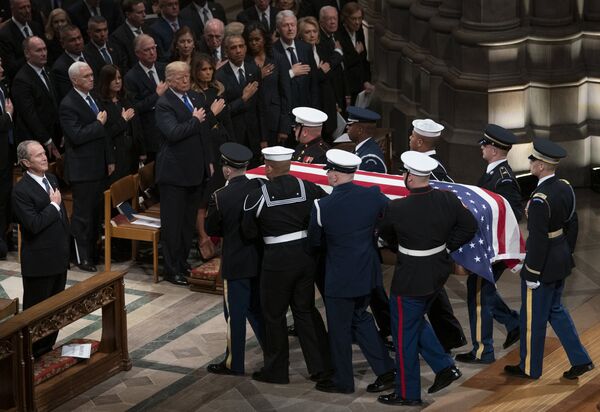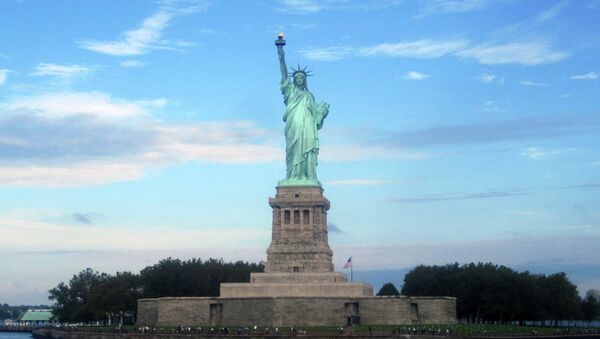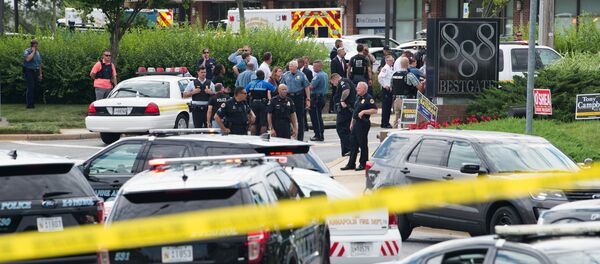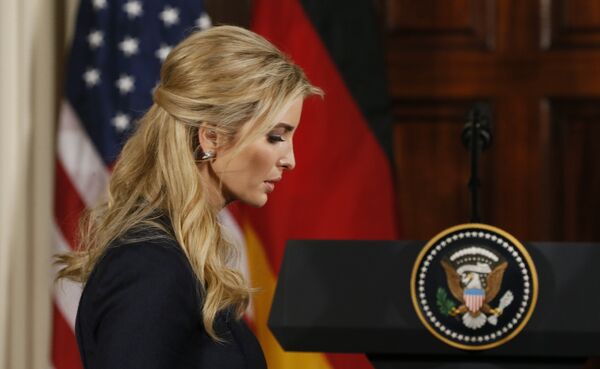1. A Shut-Down Government
The hugely polarized US politics have taken their toll on the government, which saw three shutdowns this year. All of them involved disputes over the thorny issue of immigration.
On 20 January, US government agencies partially halted their operations for three days after the Republican and Democratic lawmakers disagreed over the Obama-era Deferred Action for Childhood Arrivals (DACA) policy, which prevented the deportation of hundreds of thousands of undocumented immigrants who came to the United States as children.
READ MORE: Real Impact of US Govt Shutdown Limited, Perception Has Larger Effect – Scholar
The second shutdown stretched for less than a day on 9 February. The two parties again locked horns over Trump's proposed increase in spending on domestic and military programmes; Congress eventually passed a spending bill that included $300 billion in additional funds and extended the federal debt ceiling to March 2019.
The shutdown of one-quarter of US government was ordered by Donald Trump on 21 December after Democrats in the Senate refused to give additional $5 billion in funding for border security and his cherished wall on the US-Mexico border. The House and the Senate adjourned on 27 December, extending the partial closure of government agencies into January. New members of Congress that were elected in the midterms will be sworn in on 3 January, and the Democratic majority in the House is expected to pass a new spending bill.
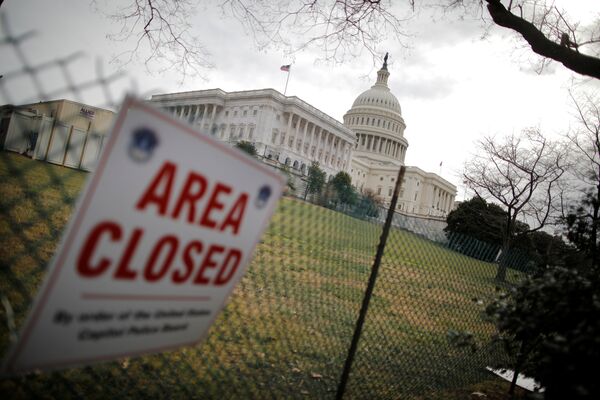
2. A Stormy Daniels
While not everyone has noticed the partial closure of government agencies, a dramatic personal story with a political touch occupied the national headlines in January, when it emerged that Donald Trump's former long-time fixer, Michael Cohen, had paid $130,000 in hush money to adult film actress and director Stormy Daniels.
READ MORE: Stormy Daniels Ordered to Pay Trump $293,000 Over Rejected Lawsuit
Mrs Daniels (real name Stephanie Clifford) claimed that she had sex with Trump in 2006, a year after he married now-First Lady Melania. Cohen signed a non-disclosure agreement with Stormy Daniels in an attempt to keep her quiet ahead of the 2016 vote, fearing that she would otherwise hurt Donald Trump's chances of winning the presidency.
After months of denials, Michael Cohen admitted in August that the money came from Donald Trump's campaign funds at his request and thus can be considered his personal indirect contribution to the campaign. He also confessed that he gave $150,000 to Karen McDougal, a model and actress who also allegedly had a 9-month-long affair with Trump in 2006-2007. The President, who previously stated that he was unaware of the payments, later said that he did "nothing wrong" with respect to campaign finance laws.
3. A Revolving Door in the White House
Moving on from Trump's alleged affairs with women to his relations with employees, this year has seen an array of high-profile White House departures. Hope Hicks, the White House communications director and one of Donald Trump's closest aides, resigned on 28 February after just six months in office. Her decision came one day after her 9-hour testimony before congressmen as part of the Russia investigation, where she confessed that she had occasionally told "white lies" for the President.
Reports also suggested that the move could be linked with the resignation of her boyfriend, Trump staffer Robert Porter, who left his post on 8 February over domestic abuse accusations from both of his former wives.
READ MORE: A Dirty Job: Donald Trump's Critics Take Aim at White House Revolving Door
Gary Cohn resigned as White House chief economic advisor on 6 March after he opposed Donald Trump's protectionist decision to introduce import tariffs on steel and aluminium.
Trump fired Secretary of State Rex Tillerson on 13 March; he acknowledged that Tillerson's support for the Iran nuclear deal, which the POTUS had repeatedly slammed, could have contributed to the decision.
Also on 13 March, Donald Trump's long-time personal aide John McEntee was sacked after being targeted by a DHS investigation into his alleged financial crimes.
Just a week after Tillerson's dismissal, HR McMaster stepped down as Donald Trump's national security adviser. The two had also clashed over the 2015 nuke accord; in addition, McMaster shortly before his resignation that Russia's purported meddling in the 2016 election was "incontrovertible" — something that Trump adamantly denied.
Donald Trump's homeland security adviser, Tom Bossert, resigned on 10 April at the behest of new national security adviser John Bolton.
Defence Secretary Jim Mattis on 20 December announced his resignation at the end of February, citing fundamental disagreements with Donald Trump. Mattis' decision came a day after Trump declared that he would withdraw all 2,000 US troops from Syria, something the outgoing defence chief had previously slammed as a "strategic blunder" that would give the terrorists the opportunity to recover.
4. A Facebook Data Scandal
Political controversy has been swirling around tech giants as well as politicians. Social media site Facebook acknowledged in April that Cambridge Analytica, a political consultancy firm with ties to Donald Trump, harvested the personal information of about 87 million people in a bid to predict and possibly influence voters' opinion prior to the 2016 election — a revelation that cost Facebook some $100 billion in market value.
The news prompted concerns that the data of Facebook's whopping 2.2-billion audience could be at risk. The company's founder and CEO, Mark Zuckerberg, apologised before Congress, saying that the massive data leak was a "breach of trust", pledged to fix the problem but refused to admit that his platform sells data.
Facebook also reported in October that the data of at least 30 million users was hacked through a security breach that exploited a vulnerability in its code.
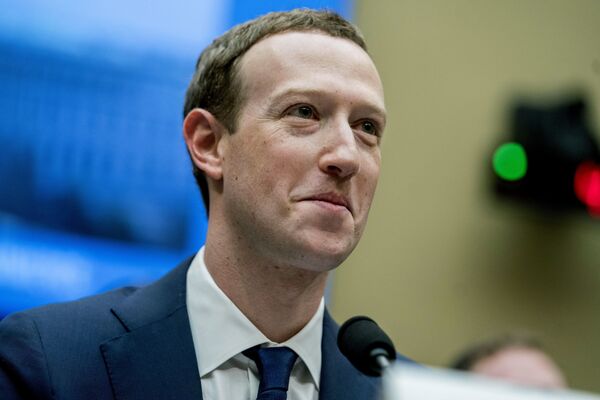
5. A Rise in Mass Shootings
As part of a much more unsettling trend than Facebook's unguarded data policies, there have been 337 mass shootings in the United States in 2018 so far, according to Gun Violence Archive (a non-profit that tracks gun-related violence). Not every shooting makes it to the headlines, but some of the most brutal ones rocked the country this year.
A school shooting in Parkland, Florida on Valentine's Day claimed the lives of 17 students and teachers; four people were slain at a Nashville restaurant on 22 April; ten people, mostly students, were killed in another school shooting rampage in Santa Fe, Texas on 18 May; five were shot dead in the Capital Gazette offices in Annapolis, Maryland on 28 June; five were killed in a murder-suicide in Robstown, Texas.
Massacre in a Pittsburgh synagogue claimed 11 lives, including two police officers. In the most recent infamous incident, a gunman killed 12 people and shot himself at a nightclub in Thousand Oaks, California on 9 November.
6. A Besieged Border
Hundreds of kilometres away from Washington, DC, the United States' southern border has been the target of multiple attacks from inside and outside the country. Donald Trump, a staunch proponent of tough immigration laws and a wall on the Mexican border, came under fire for his policy of separating immigrant children from their families.
He was forced to sign an executive order to end border separations on 20 June, after it emerged that under 3,000 children were isolated from their parents in April-May and put in detention centres.
American border guards faced another threat in October and November, when a mass exodus of migrants from Central America, primarily Honduras, arrived in Mexico. Trump branded the so-called migrant caravans as an "invasion" and threatened to detain or turn away the would-be asylum seekers.
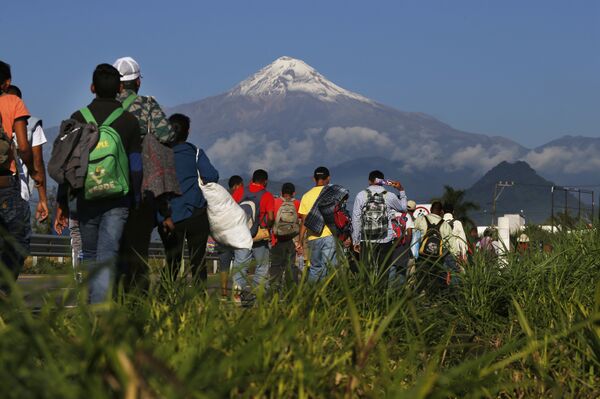
7. 'How Do You Like It, Elon Musk?'
It all started for Elon Musk in April, when Bloomberg broke that his brainchild, electric car maker Tesla, burns over $6,500 every single minute.
While the whole world was watching the dramatic rescue of a 12-strong soccer team and their coach from a flooded Thai cave, Elon Musk joined in by offering a miniature submarine from his rocket company, SpaceX, which he said could be used to retrieve the kids through underwater tunnels.
His plans were dismissed by the rescue team, but the industrialist still managed to steal the show: he called Vern Unsworth, a British diver who earlier branded his sub idea as a "PR stunt", a "pedo guy" and "child rapist" — and was sued for defamation in response. Musk asked the judge to scrap Unsworth's lawsuit on the grounds that his comments were a "schoolyard spat on social media" and were not intended to be "statements of fact".
The 47-year-old visionary announced via Twitter on 7 August that Tesla could go private at a price of $420 per share, at a time when the stock was trading at some $358. Tesla's stock price jumped up six per cent from the following Musk's tweet, prompting accusations that he was making false and misleading statements in an effort to boost the company's value.
Am considering taking Tesla private at $420. Funding secured.
— Elon Musk (@elonmusk) 7 августа 2018 г.
The US Securities and Exchange Commission (SEC) filed a lawsuit against Musk for securities fraud on 27 September; although he said the accusations were "unjustified", he later reached a settlement with the SEC. As part of the deal, Tesla and Musk would pay $20 million each to harmed investors; the company's founder would also step aside as its chairman for three years, but would remain its CEO.
As a result, Tesla on 8 November replaced Elon Musk as the chair of its board by Robyn Denholm, the chief financial officer and head of strategy at Telstra Corp., an Australian telecom company.
8. An Embattled First Lady
US headlines have not left out Melania Trump in the cold either: while the FLOTUS generally keeps clear of the cold war between her husband and the mainstream media, she often becomes the target of public criticism. Melania drew flak in May over the title of her "Be Best" anti-bullying campaign for children, which some said was grammatically incorrect.
READ MORE: Twitter Chastises Melania Trump for Wearing 'Colonial' Headgear in Africa
She also came under fire for wearing a jacket sporting "I don't care" during her trip to a Texas child detention centre. Critics accused her of not caring about the troubles of isolated migrant kids but she later revealed that the message was aimed at left-wing media.
Later in the year, Melania was ridiculed on social media for going blonde as well as for her perceived lack of understanding of what the First Lady's job is about.
Her spokeswoman said that the media were "consistently" ignoring Melania's First-Lady-like activities and failing to provide unbiased coverage.
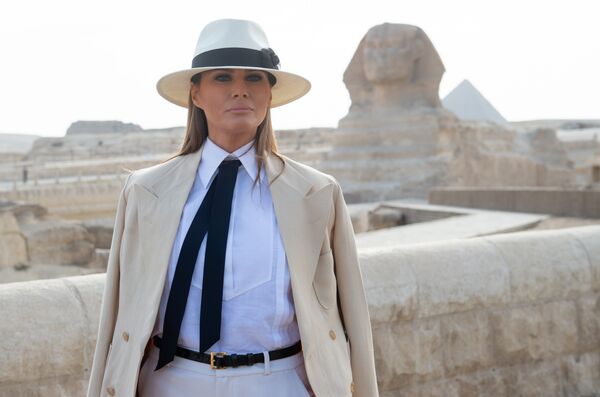
9. A Bruising Battle Over Brett Kavanaugh
The confirmation process of Donald Trump's Supreme Court nominee Brett Kavanaugh was overshadowed by sexual allegations from three women dating back to the ‘80s. The key accuser, Christine Blasey Ford, claimed that Kavanaugh attempted to rape her at a high school party.
Another accuser, Deborah Ramirez, alleged that the embattled judge exposed himself to her at a party when he was a freshman at Yale, while another woman, Julie Swetnick, said that was the victim of drugging and gang rape where he was present.
Brett Kavanaugh adamantly denied all accusations, and following an FBI investigation the Senate confirmed his pick by a narrow margin 50-48. He was sworn in to the nation's highest judicial body on 6 October.
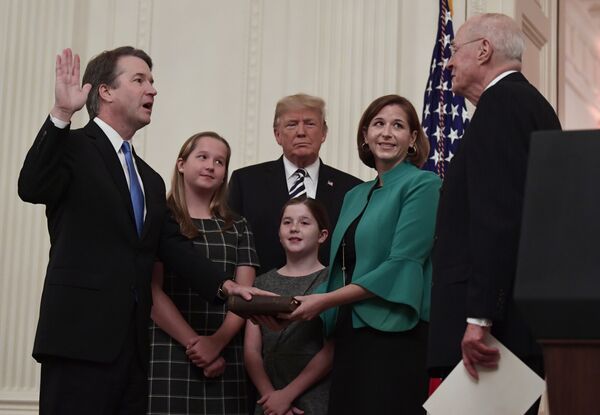
10. A Crucial Midterm Election
November congressional elections were widely seen as a nationwide voter test on Donald Trump's two years in office — and the 45th President had a 50-percent score. Democrats failed to achieve a "blue wave", which took over the House but "hit the red wall" in the Senate, as political commentators point out.
In plain numbers, Republicans increased their Senate majority by 2 seats to 53, while Democrats picked up 39 for a total of 235 House seats to Republicans' 200.
That the GOP lost the House means that Democrats will try to disrupt Donald Trump's agenda until the 2020 presidential vote. The POTUS, nevertheless, praised the election results as "tremendous success", but it was soon overshadowed by another scandal…
11. An Ivanka Emailgate
Ivanka Trump found herself at the centre of a storm in November, after White House ethics officials discovered that she had repeatedly used her personal email account for government-related correspondence.
The email scandal inevitably triggered parallels with that of Hillary Clinton, who reportedly circulated conducted government business through her private email server during her time as Secretary of State. An FBI investigation into Clinton's affair concluded that she did not intend to expose classified data, and she did not face criminal charges.
A spokesman for Ivanka's attorney said that her emails mostly concerned family issues and logistics, unlike in Clinton's case. Ivanka herself stressed that she had not deleted any emails and made no attempts to hide a potential breach of federal records laws.
12. A Pro-Trump Rap Star
While a host of Hollywood stars don't miss a chance to chide their president, it should not come as a surprise that mass media were set alight by Kanye West's bromance with Donald Trump. Kanye, or Ye, as he now calls himself, said that the POTUS is "his brother" and they both have "dragon energy".
You don't have to agree with trump but the mob can't make me not love him. We are both dragon energy. He is my brother. I love everyone. I don't agree with everything anyone does. That's what makes us individuals. And we have the right to independent thought.
— ye (@kanyewest) 25 апреля 2018 г.
In October, West made a controversial appearance on Saturday Night Live, donning a MAGA hat — a headwear choice that speaks for itself — and delivering a pro-Trump rant. "There's so many times I talk to like a white person about this, and they say, ‘How could you like Trump? He's racist.' Well, uh, if I was concerned about racism, I would've moved out of America a long time ago".
Kanye, who also suggested amending the 13th Amendment which abolished slavery, was booed by the SNL audience and Twitterians alike and was eventually forced to shut down his Twitter and Instagram. However, he won praise from the President, who said that Kanye was "leading the charge".
Like many, I don’t watch Saturday Night Live (even though I past hosted it) — no longer funny, no talent or charm. It is just a political ad for the Dems. Word is that Kanye West, who put on a MAGA hat after the show (despite being told “no”), was great. He’s leading the charge!
— Donald J. Trump (@realDonaldTrump) 30 сентября 2018 г.
Shortly after, Kanye was invited to a sit-down with Donald Trump in the White House. He went on a 10-minute monologue there, in which he touched upon racism, American industry, gun violence, and criminal justice — a speech that the surprised Trump described as "quite something".
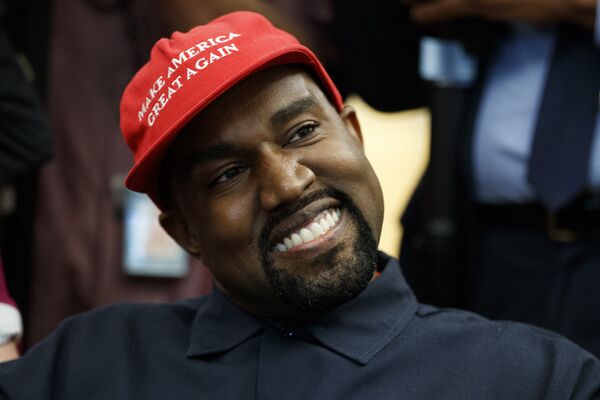
13. A Year of Losses
John McCain, a Republican senator and anti-Russia hawk, died aged 81 on 25 August, a year after he was diagnosed with brain cancer.
McCain, the 2008 Republican presidential nominee, has clashed with 45 a number of times. Specifically, he claimed that Trump had "fired up the crazies" when the latter slammed immigration at an election rally. Donald Trump in response questioned the heroism of McCain, who was a prisoner of war in Vietnam. "He's not a war hero. He's a war hero because he was captured. I like people that weren't captured".
Another notable US politician died a few months later: the nation's longest-living president, George H.W. Bush passed away on November 30 at the age of 94. ‘Bush senior' served a turbulent term in 1989-1993, which saw the collapse of the Soviet Union and the Eastern Bloc, as well as the US military build-up in the Middle East during and following the Gulf War.
